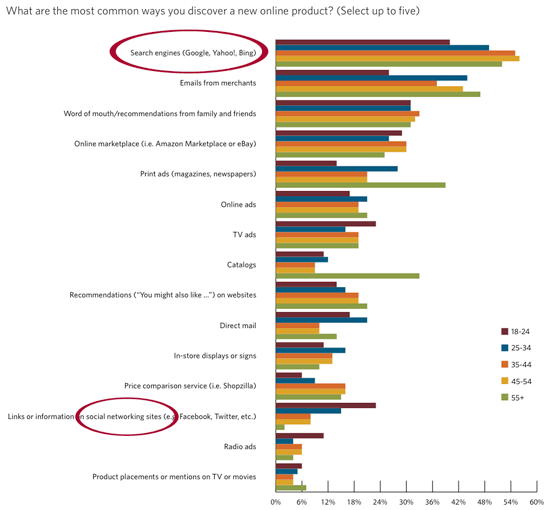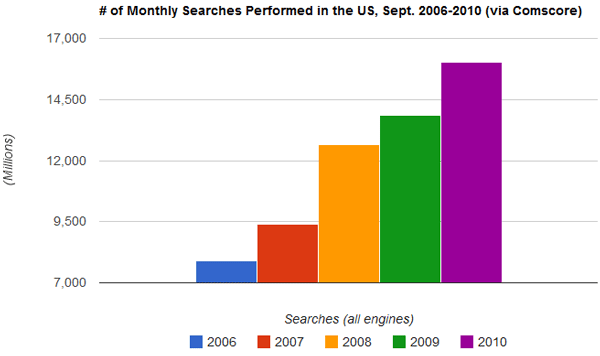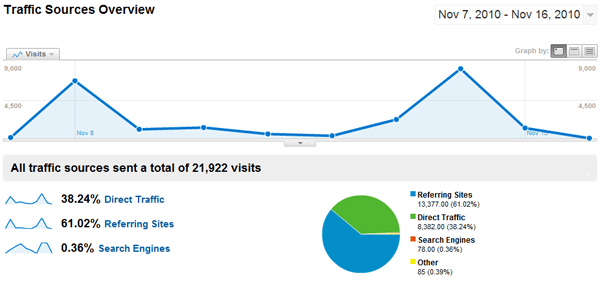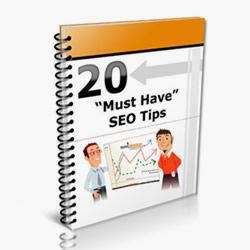If you eat, sleep and breathe SEO then you have seen the steady flow of posts about search engine optimization vs. social media marketing starting with this effective but little evidenced viral link bait article by Darren Rowse and Elysia Brooker. Well there are several points I have believe they are in error over this post is not about those.
We Search for What We Want + Need
The search for information and answers has been essential to humans since time immemorial. And there’s no sign that our latest iteration, web search, is losing any steam:
As broadband integration into our home lives reaches maturation process searches are increasing. People are not searching less per month; they are searching staggeringly more than ever before.
Search is based on the users intention. We do not search without a purpose. We search to find answers, information services and products. The power of search marketing – whether sponsored (paid) or organic – is simple. Be in the consumers grill and the time they are consuming. There is no more effective time to be present and no more effective way of knowing what they want.
We Are Social to Learn and Share
Social media a a technology- Whether it’s Twitter, Facebook, Flickr, Reddit, StumbleUpon or something else – is about connections, interaction, discovery and distraction from every day boring life. We almost never use twitter to find out the address of the closest pizza place.
Social media marketing champions often make the point that social is how we find out about new products on the internet. But at least to several key players in the industry the data has yet to back up this assumption.

–
ATG Study on How Users Discover Products via SearchEngineLand
However, I am strongly inclined to believe the claim that social media is how we find out about new content on the web, particularly when we’re not seeking something in particular (as with a search). Blogs, pictures, video, research and the like are surely seeing an increased share of their visits from social, and that branding exposure is definitely valuable.
Some recent GroupM Research helped to shed the light of data on this supposition, noting that:
- The click-through rate in organic search results for users who have been exposed to a brand’s social marketing campaign are 2.4X higher than those that haven’t; for paid search, it showed a jump from 4.5% to 11.8% (in both cases, this is for branded queries)
- Consumers using social media are 1.7x more likely to search with the intention of making a list of brands or products to consider purchasing compared to those who do not use social media
Ben Yoskovitz talked about this value in his recent analysis:
Based on the information in this report, it’s reasonable to argue that social media marketing can increase the quality of leads (and not just the volume). It’s possible to hone in on, and understand intent through search and how social media exposure affects that intent. And as people are exposed (and I would say involved with – since exposure sounds like you’re just broadcasting stuff at people, which isn’t what social media is about) to social media their intent is more focused and driven towards lead conversion
That’s the kind of social media marketing value I can get behind. Get exposed to potential customers through social so that when they build their consideration set, search and purchase, you’ll have a leg up on the competition.
What Drives Traffic (and Converts) for Whom
It pays to understand the bias of this flare-up’s instigator, and I’ve got plenty of compelling data myself to see his perspective. Last weekend, I started publishing content on a personal blog – no domain authority, no links and little chance of performing well in search. But the results from social media – Twitter, Facebook and Hacker News in particular – are fairly remarkable:
The search traffic demand, all 78 visits, was generated from the articles that went popular on Twitter & HN. The site itself still doesn’t rank for its own name. Yet, social media sent 22,000 visits over 9 days. No wonder bloggers, in particular those that monetize through advertising, sponsorships and other traffic-driven systems, have a proclivity for investing in social traffic. Perhaps it’s not so crazy to suggest on Problogger.net, a site about growing blog traffic and improving monetization, that social can be “better” than SEO.
I’d still argue that overall, referring traffic of all kinds sent from social, particularly from the largest network (Facebook), is only a fraction of the visits Google sends out each day (unless you’re in the business of appealing to the Facebook audience biases – I was a bit frustrated with how the data was clearly manipulated in the reference piece to fit the story). But, social does eliminate some of the inherent biases that search engines carry and let content that appeals to social users flourish no matter the site’s ability to grow its link profile, make content accessible to spiders or effectively target keywords.
Now let’s look at an example on the opposite end of the spectrum – conversions for a B2B product.
Ewing Enterprise’s PRO membership may not be a good investment unless you’re a marketer actively engaged with SEO, but given that both the search and social traffic our site attracts likely fall into this intent group (interested in SEO and likely to be in web marketing), a comparison seems fair.
First, I did some prep work in our Google Analytics account by creating an advanced segment called “social traffic” that contains any referral source with “twitter,” “facebook,” “stumbleupon,” “linkedin,” “flickr,” and “ycombinator” – these represent the vast majority of our social media sources. Next, I compared this traffic quantitatively with our search referrals over the past two weeks:
- Social Traffic – 26,599 visits from 30 sources
- Organic Search Traffic – 102,349 from 20 sources
I then compared the percent of these reaching our landing or purchase pages for PRO membership. Here’s organic search:
And here’s social traffic:
Here’s what I see:
- 4.5% of organic search visitors considered a purchase
- 1.3% of social traffic considered a purchase
- While I can’t disclose full numbers, I can see that a fair number of search visits converted vs. zero for social.
In fact, looking at the entire year to date traffic to SEOmoz from social sources, it appears not 1 visit has ever converted for us. Social may be a great way to drive traffic, build branding and make a purchase more likely in the future, but from a direct conversion standpoint, it doesn’t hold a candle to search. To be fair, I’m not looking at full life cycle or even first-touch attribution, which makes this analysis less comprehensive, though likely still directionally informative.
Takeaways
Given the research and data here and in the posts/content referenced, I think we can say a few things about search and social as marketing channels:
- There shouldn’t be a VS.: This isn’t about pitting web marketers against each other (or perhaps, more accurately, themselves, since our industry survey data suggests many of us are responsible for both). There’s obvious value in both channels and to suggest otherwise is ideological nonsense and worse, self-defeating.
- Search Converts: $20 Billion+ isn’t being wasted on Google’s search ads – that sucker send intent-driven, focused, conversion-ready visits like nobody else on the web.
- Social Has Value: Those exposed to a social campaign are better customers and prospects; making social not only a branding and traffic channel, but an opportunity for conversion rate optimization.
- SEO Is Hard in the Early Stages: Without a strong link profile, even great content may not perform particularly well in search results.
- Segmenting Search and Social is Key: Unless you separate, analyze and iterate, you’re doomed to miss opportunities and falsely attribute value. I’m particularly worried about those marketers who invest heavily in social to the detriment of SEO because the immediacy of the rewards is so much more tangible and emotionally compelling (He’s following me on Twitter! We have 200 Facebook fans!) – make sure appropriate effort goes where it can earn ROI; it’s our job.
For another interesting (and more social-media biased) perspective, check out Search vs. Social from Bradford Cross.
I’d love to hear more from you on this topic, too.





